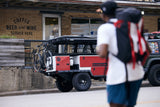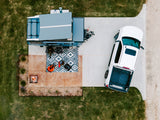When I first envisioned life on the road, I pictured myself smoking salmon and roasting marshmallows over an open fire. I felt sure I would love cooking at camp with or without the RV. But, you know what? I really don’t! Will you? Only time will tell.
Remember before you leave
These tips should cover the basics so that you’re prepared (and don’t forget any important items!) for cooking in the wilderness, whether you’re in a comfy RV or a minimalist overlanding camper.
1. Consider your cooking setup
Adding an RV or camper to your travel setup can make it so much easier to cook at camp. However, it’s important to remember that not all RVs have fully contained kitchens. You might even prefer it that way, to be more immersed in the wilderness.
Here are some questions to ask yourself before cooking as a first-time RVer:
- Do you have an indoor or outdoor kitchen?
- If your RV or trailer only has an indoor kitchen, is it worth also having outdoor cooking facilities?
- Does your kitchen need propane, electricity, or all of the above?
- What facilities do you have for washing up?
- How much storage do you have for food items and cooking utensils?
Considering all of these questions will give you a solid starting point for prepping and moving onto the next tips.
2. Plan for your cooking environment
When you cook at home, your only consideration is whether you have the right ingredients. You can hop in the car and make a quick grocery run if you don’t. It’s a lot different at camp. Cooking outdoors is incredibly unpredictable and can introduce many of the same concerns you had when tent camping.
- Wind: Most of the areas I camp in experience high winds. These can either blow your fire out or send sparks flying into the dry brush around you. The fear of causing a wildfire is one of the top reasons I generally reduce my time cooking over an open fire. Always check the wind speed and direction (and follow Leave No Trace principles).
- Rain: Rain is usually not a concern when camping in the desert, but I did have rain while tent camping in New Mexico one Thanksgiving. Some campgrounds will have covered areas, and sometimes you need to create one with an awning (or a swing-up door like TigerMoth’s). Some people cook inside large ground tents, but this can be dangerous.
- Wildlife: Keep wild animals wild. One crucial way to do this is to keep human food out of their reach. This is less of a concern in the desert unless cougars are on the prowl. In forested areas, you need to be more vigilant. Look out for bear warnings and plan accordingly.
- Water: If you have limited access to water when camping, you might want to factor this into your meal choices. When I have to conserve water, I consider how much I need for preparation, how often I’ll need to wash my hands, and how much water I’ll need to clean the cooking utensils.
- Power: Your camper might not have an oven, and running a toaster oven or convection oven would require shore power. You could also use a generator or a heavy-duty solar power system. I have a solar oven and campfire toaster. Some RVers have also had exceptional results from using dutch ovens. For more information about this, see our in-depth guide on camper and trailer power systems.
3. Keep it simple

When I have my camper packed up with full amenities, I cook elaborate meals. We’re talking crab legs, coconut curry salmon, pizza, and crispy shrimp. I usually don’t attempt these meals when overlanding or even when boondocking with the trailer. Instead, I look for simple meals with fewer ingredients and shorter prep times.
How simple you want to make your meals is up to you. For me, simplicity means just adding water. For you, it might mean pre-packaging your meals or pre-measuring the ingredients. Here are some cooking tips based on how I approach simple meals:
- There are dehydrated meals you can purchase that just require adding water. Examples range from instant oatmeal to a packet of Thai curry made by Good To Go.
- Some pre-packaged meals can have delicious results and require boiling for about ten minutes. Examples include canned soups you can heat, mac and cheese, or pre-packaged rice and beans.
- One-pot meals are another great way to simplify the cooking process and save space. These meals usually have you cook everything in one regular pot or an instant pot. You can find recipes and one-pot cooking tips all over the internet.
For more pointers, see our guide to camping meals and cooking.
4. Camp cooking gear
You’ll need some basic items, whether you’re cooking with full hookups or with your overlanding buddies in the middle of nowhere. Consider making a list and adding these items:
- Cooking oil or spray: You’ll need this for cooking over a fire so your food doesn’t stick to the pan.
- Matches or a lighter: I recommend having two methods for starting a fire just in case. So, consider a backup source even if your RV maintains a pilot light.
- Pot or pan: You can use a pot to cook over the fire or use it as a dishwashing container. If you plan on doing any baking, you’ll need that dutch oven.
- Spatula: This will be your best friend when cooking over the fire. It’ll help you flip pancakes, burgers, or whatever else you’re cooking.
- Tongs: These are great for grabbing food from the pot or flipping meat on the grill. I tend to use this more often than a spatula.
- Eating utensils: Many people I meet at camp tend to forget forks, spoons, and butter knives. I like compostable one-use utensils, but these add to the trash.
- Dish soap and sponge: You’ll need these to wash your dishes. I almost always forget the sponge and then end up using paper towels to wash up.
Click here for our recommendations to create the ultimate camper/RV kitchen setup.
5. Bring only what you need
You might feel tempted to bring the entire spice rack, your pots and pans, and every kitchen gadget you own. However, food and cooking items weigh a lot more than you might think. More weight means more stress on your vehicle and higher fuel consumption.
But, not to worry! Over time, you’ll realize that you only use a few items when cooking in your RV or over the campfire. Pay attention to these items and gradually eliminate other things from the list.
Another great way to avoid bringing too many things is to plan (or even prep) your meals for your trips ahead of time. Then, identify the ingredients you need to make these meals and get just that. I recommend two options for breakfast, lunch, dinner, and cold beverages. Then, toss in a few snacks and a hot drink.
Additional quick tips & ideas
Beyond these five tips, there are plenty more that can help your outdoor cooking, especially for beginners:
- Keep your workspace clean: Maintaining a clean workspace in your RV kitchen is essential to ensure safety, prevent accidents, and make meal preparation more efficient.
- Start with food and recipes you already know: When you're new to RV cooking, it's a good idea to start with foods and recipes you already know how to prepare to build your confidence and adapt to the RV kitchen environment.
- Print out/screenshot recipes: Printing out or taking screenshots of recipes can be a lifesaver when you have limited internet or reception, ensuring you have access to your favorite dishes even off the grid.
- Figure out coffee plans ahead of time: Planning your coffee routine in advance, whether it's buying pre-ground beans, instant coffee, or a French press, can help you start your mornings right during your RV adventure.
- Clean as you go: Practicing the "clean as you go" approach prevents dishes from piling up, saves time on cleanup, and allows you to fully enjoy your RV experience without worrying about a messy kitchen.
Bring everything you need with you, nothing you don’t
When cooking at camp, make it more about the experience than the food itself. Even if you decide to go alone, the sense of independence can be as thrilling as spending time with your loved ones. TAXA’s habitats embody this, with standard and overlanding editions of their campers that give you everything you need — but nothing you don’t. This keeps you focused on enjoying the reason you’re in an RV or trailer: your surroundings. Prepare to be resourceful if you forget something, and don’t be afraid to ask your neighbors for a bit of oil, sugar, or campfire cooking tips. Most of us are friendly and will be happy to share some with you. We’ve been there!


